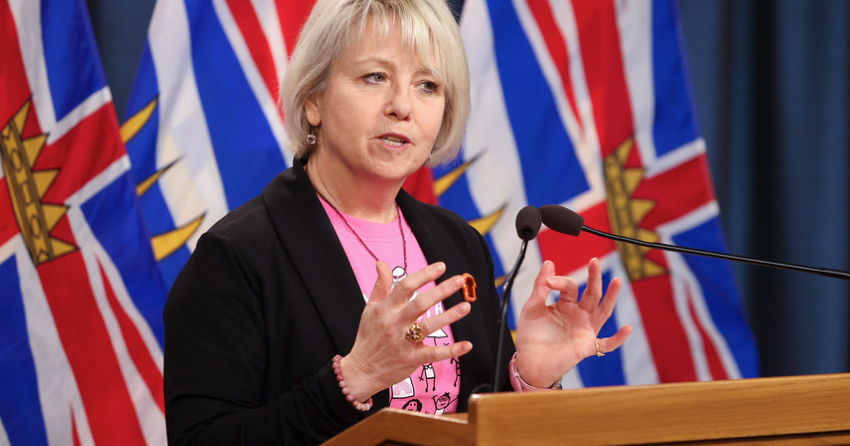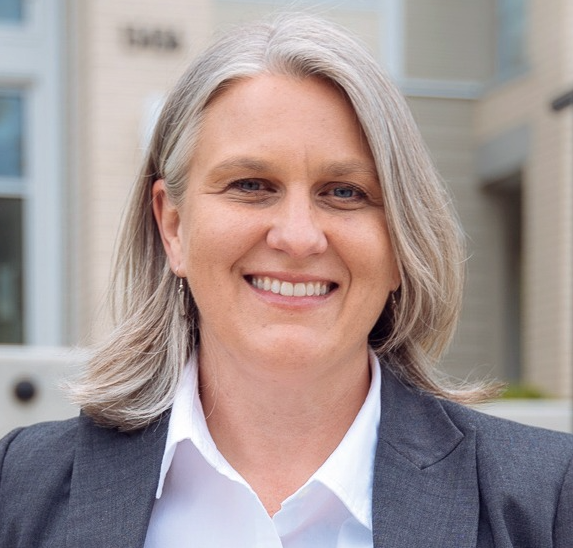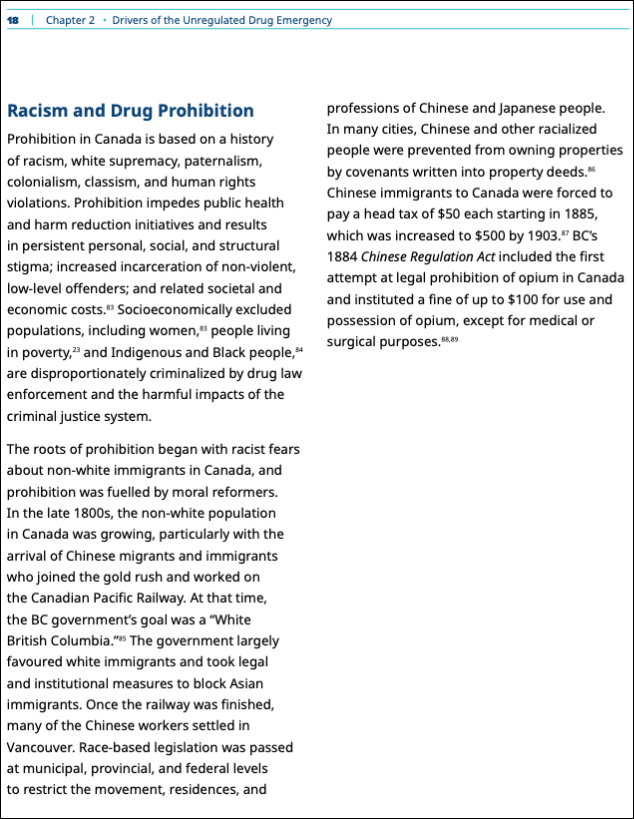The drugs report released by Provincial Health Officer Dr. Bonnie Henry last week has come in for plenty of criticism, including from Premier David Eby.
Most of that criticism has centred on Dr. Henry’s main recommendations, including that the BC government should consider allowing people to obtain alternatives to street drugs without a prescription.
But another aspect of the report that has rubbed some observers up the wrong way is its use of language.
‘White occupier’ and ‘Canadian settler’
The document, which can be read in full here, includes dozens of references to “white supremacy,” “decolonization,” “systemic racism” and other terms associated with certain academic disciplines, as well as activist groups such as Black Lives Matter.
It claims drug prohibition in Canada “is based on a history of racism, white supremacy, paternalism, colonialism, classism and human rights violations.”
The report mentions various historical events, including the Opium Wars, the head tax on Chinese immigrants and the “moral panic” associated with the Opium Act of 1908.
It emphasizes that BC’s drugs crisis has been “exacerbated” by “the impacts of colonialism and racism” and that the Office of the Provincial Health Officer (OPHO) is “deliberately taking anti-racist and anti-white supremacy approaches” to its work.

The “acknowledgements” section of the report – which appears within the first few pages – has also been criticized for the way the contributors are described.
The first words used to describe nurse and academic Bernie Pauly, for example, are “third generation Canadian settler of German ancestry.” Several lines later, at the end of the description, her employment and expertise are listed.
One contributor is described as “Cree/settler,” one as “English settler and immigrant” and another simply as “white occupier.”
The final acknowledgment is for a contributor described as a “white occupier of mixed European and Ashkenazi Jewish descent.”
A spokesman for the OPHO told NowMedia that “knowing who our ancestors were” is part of the office’s devotion to “anti-racism” and “truth and reconciliation.”
He said the contributors were given the “opportunity … to reflect on and share their understanding of their relationship to settler colonialism.”
One of the "subtle, but powerful" ways that "settler colonialism is perpetuated is through the silence of settler people’s relationship to these lands and territories," he added.
‘Never seen anything quite like this before’
But Surrey South MLA Elenore Sturko, who leads on matters of mental health and addictions for the Conservative Party of BC, said she was “taken aback” by the report’s language, explaining that she’s “never seen anything quite like this before.”
“This is a form of activism within the public service,” she told NowMedia, adding that she found the report’s framing “concerning” and “very, very political.”
Both her party and the official opposition, BC United, called for Dr. Henry to lose her job in the wake of the report’s publication.
She told NowMedia that, while she supports the right of individuals to freely express themselves, expectations are different for an institution like the OPHO.
.png)
“I certainly am not a person who believes in cancelling anyone for their own personal ideas that I might not agree with – and I believe also in free speech – but when it comes to publicly funded documents and reports, I think that they need to be politically neutral and secular,” she said. “We need to be having things that would have a broad appeal because they truly should be serving all British Columbians.”
Addiction, she insisted, “doesn’t have any barriers in terms of our ethnicity, our background, our sex, our age, our gender expression. It can affect anyone.”
“To root everything in history and in historic [events] like colonialism I think takes away a little bit from a lot of the scientific research that's out there,” she added. “You know, we have the Stanford-Lancet report, things that argue that the more drugs, and the more easily available things like opioids are, the higher the rate of population-level addiction.
“This is a political framing of a social problem, of course. I find it concerning just to see a report framed in this way. It's very political.”
‘Kindergarten-level reasoning’
Another critic of the report’s language was Adam Zivo, an activist, journalist and the executive director of the Centre for Responsible Drug Policy.
He said that “to dress up certain radical drug policies in the language of anti-racism” is both “inaccurate” and “deeply offensive to many communities.”
“We have to remember that racialized communities on the whole do not seem to support the kind of libertarian drug policies that Bonnie Henry strongly advocated for in her report,” he told NowMedia.
“We see that most clearly in Canadian Indigenous communities, which largely oppose increasing access to opioids and alcohol.”
Zivo, who describes himself as a believer in “practical social justice,” said it’s “very understandable” that some Indigenous communities would be resistant to drugs being made more easily available.
Certain colonists “destroyed” such communities with “addictive substances” hundreds of years ago, he said. “For us to ply Indigenous communities with, quote unquote, safe opioids is merely a reconstruction of old colonial abuses,” he argued.
The claim that the prohibition of drugs is connected with European colonialism or white supremacy, Zivo added, is “condescending, Eurocentric and fundamentally colonial.”

Zivo, who often writes about Canada’s drugs crisis for the National Post newspaper, cited the “historical and colonial trauma” among Chinese communities caused by the Opium Wars, a series of 19th century conflicts between European powers and the Qing Empire over the latter’s desire to prohibit the sale of opium. He also referred to attitudes toward prohibition in modern Singapore, as well as among ancient Islamic scholars.
“Bonnie Henry needs to understand that other cultures do not revolve around Europe and white people. White people do not dictate the legal codes and cultural beliefs of the entire world,” he said.
Some of the “staunchest opposition to radical drug policies in BC today often come from East Asian communities,” he added.
Determining the sentiments of entire communities is, needless to say, extremely difficult. But recent surveys on voter intent in BC do certainly appear to reveal high levels of support for the BC Conservatives.
In one recent poll, the BC Conservatives – who differ from Dr. Henry dramatically in their approach to the drugs crisis – were listed as the top party for voters described as Southeast Asian, South Asian, Middle Eastern and white.
A plurality of East Asians, meanwhile, backed the BC NDP – but even more backed either the BC Conservatives or BC United, which also rejects Dr. Henry’s approach.
Zivo, meanwhile, said he first became aware of Indigenous opposition to the likes of the “safer supply” policy when he interviewed a senior band member in Campbell River following the seizure of thousands of pills earlier this year.
Many Indigenous leaders, he said, “don’t feel as if they were consulted” about such schemes.
The “narrative” in Dr. Henry’s report that drug prohibition is based on white supremacy and colonialism, he added, is false. He told NowMedia he considers it to be “rooted in kindergarten-level reasoning.”
“The underlying argument that they make, and this is explained within the report itself, is that because Canada initially implemented drug prohibition laws in the early 20th century in response to a fear of Chinese immigrants, who were using opium at that time, that must mean that all forms of drug prohibition are racist and colonial,” he said.
Just because prohibition “was used in a racist way in a particular case 100 years ago” does not mean, he continued, “that all forms of drug prohibition are racist and colonial.”
‘White upper class progressives dictating what counts as white supremacy’
Why, then, is such language – which is evidently controversial – being used by public health experts in BC?
Zivo said some of those experts “exist within a bubble” and are “surrounded predominantly by academics who are alienated from all the ground realities and alienated from the opinions of average, working class Canadians.”

It’s possible to see the sort of “ideology” the experts – including Dr. Henry – are guided by, he said, in the acknowledgements section of the report, where contributors list their ethnic origins.
The vast majority of those people are white, he noted.
“So you had what was essentially a group of white upper class progressives dictating what counts as white supremacy, what counts as racism, in spite of the views of [non-white] communities, who are just generally not listened to,” he said.
“They may believe that this is necessary, but I believe their prioritization of these kinds of gestures suggests that they value performative anti-racism over meaningful engagements with racialized communities and their ideological diversity.”
White supremacy ‘pervasive throughout BC’s healthcare system’
Dr. Henry’s office, however, has a very different perspective on the matter.
A spokesman for the OPHO told NowMedia the section listing the ethnicity of contributors was indeed “different from previous reports.”
But it was introduced for a specific purpose.
“[It] creates an opportunity to deepen our shared understanding of settler colonialism and foundational, legislated obligations to Indigenous peoples, and our responsibilities to uphold their inherent rights,” the spokesman explained, referring to commitments made at the provincial, federal and international levels.
The OPHO, he said, is “a champion for introducing unlearning and undoing of systemic white supremacy and racism in all of its work.”

There is “abundant” evidence that “Indigenous-specific racism, rooted in systemic white supremacy and settler-colonialism, is pervasive throughout the healthcare system,” the spokesman added.
One example of how white supremacy “remains embedded in our structures in ways that are hard to see” is in the “gross inequities” experienced by Indigenous people in terms of health.
They have been “disproportionately” affected by the drugs crisis, he said, suffering a 7.1-year drop in life expectancy in recent years, compared with a 1.1-year drop among the non-Indigenous.
‘It’s uncomfortable work’
“It is important to name the discomfort that surfaces when terms such as systemic white supremacy and racism are used,” the spokesman said. “At the Office of the PHO, we have been working diligently for three years to unlearn and undo systemic white supremacy in our office, and we recognize it’s uncomfortable work.”
Part of the difficult work of anti-racism and truth and reconciliation, Dr. Henry’s spokesman explained, “is to acknowledge and name the ancestry and backgrounds of each individual which can contribute to how a report is constructed.”
“Knowing who our ancestors were helps us to place ourselves in history,” he said. “A subtle, but powerful way in which settler colonialism is perpetuated is through the silence of settler people’s relationship to these lands and territories.”
He added: “In this report, we created an opportunity for each contributor to reflect on and share their understanding of their relationship to settler colonialism. Some team members locate themselves as ‘white occupiers’ of the unceded First Nations territories on which they live, and as such, they requested that be included in their biographies.
“The proactive disclosure of ancestry and histories along with job title and employer is a form of transparency and an acknowledgement of these worldviews to help provide context for the reader and show the diversity of opinions and values within.”
‘I’m not going to take someone’s identity away’
Asked what she would do about the use of such language were she to become a minister in October, Sturko told NowMedia she considers the matter to be “complex.”
“If someone wants to call themselves a colonizer, I'm not going to force them to stop,” she explained.
“I mean, if that's their belief, that's their identity, then I'm not here to take someone's identity away.”
But the former RCMP officer stressed that it’s more important to “go to the root of the problem” than concentrating on ethnicity, an approach she said she has noticed in the realm of criminal justice.
“If it's rooted in poverty, let's address poverty,” she said. “If it's rooted in education, let's address education. If it's rooted in the lack of housing, let's address housing, before we get to the point where people are in prison.”
In the context of BC’s drug policies, she said Dr. Henry and “activists within the public service” have been “solely focused on harm reduction and legalization,” with attempts made to “silence” critics such as herself.
“When you have people that have already got their hypothesis of what they think will work and then instead of disproving that hypothesis they try to gather information to bolster their position, I think that that does swing the pendulum away from impartiality and more towards activism,” she said.









.png)











